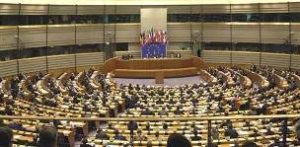 Europe once again rewards Israel in spite of violations of International Law
Europe once again rewards Israel in spite of violations of International Law
On October 23rd the European Parliament adopted the EU-Israel ACAA trade agreement by 379 votes to 230, with 41 abstentions despite the escalation of Israel’as illegal settlement policies and the entrenchment of its occupation of Palestinian lands. The vote was prompted by last month’s decision of the International Trade committee which, by a single vote, decided to oppose a further suspension of the agreement.
MEPs who voted in favor of the agreement send a dangerous signal to the Israeli government: continued settlement construction, denial of the basic rights of the Palestinian people, inhuman and degrading treatment of prisoners and the collective punishment of the population of Gaza will, in practice, be rewarded.
The consent given by the European Parliament also exposes the EU’s contradictions and inability to adjust its policies to its own stated positions. Failure to address the legal and technical issues that will be posed during the agreement’s implementation amounts to endorsing Israel’s settlement activity in a way that violates the EU’s own obligations under international law. It is in stark contradiction to the European Parliament’s own resolution on East Jerusalem which called for “full and effective implementation of existing EU legislation and EU-Israel bilateral agreements”.
Nevertheless, the ECCP would like to thank the 232 MEPs who, citing concerns with Israeli violations of international law and the fact that the agreement will provide political and economic support for Israel’s illegal settlements, voted against the implementation of this new EU-Israel trade protocol.
The ECCP would also like to thank the thousands of campaigners and human rights defenders who have sent more than 50,000 messages to their MEPs and the dozens of organisations that joined the campaign. Their commitment ensured that the debate on ACAA addressed the political issues at hand, rather than taking place in technical terms, as Israel and its supporters had tried to ensure.
The vote on ACAA shows that the active participation in campaigns to combat the support afforded to the Israeli State by the EU is more important than ever. Popular pressure must be continued and strengthened to demand that the EU upholds its international human rights commitments.
****
The breakdown of vote on ACAA is available here. You can select the votes per country, political group and MEP.
****
The next EU-Israel agreement to be discussed at the European Parliament is the Protocol on the participation of Israel in Community programmes.
The Council authorised the signature of the Protocol in February 2008 and submitted it to the European Parliament for consent. In December 2008, the consent was withheld by the EP in view of the deteriorating situation in the OPT (acceleration of settlements construction and tightening of the blockade on Gaza).
This Protocol is of prime importance to Israel as it will allow Israel to participate in all current and future EU programmes, and notably Horizon 2020, the EU research program which will replace FP7.
If the Parliament gives its assent, the protocol will be the legal basis for Israel’s participation in Community programmes and agencies. A memorandum of understanding will still need to be signed for each specific programme but without consulting the European Parliament. It will be much harder for civil society organisations to access to information and intervene in the decision-making process.
The Protocol is part of the upgrading process: Jean-Pierre Jouyet, former President-in-Office of the Council, during the debate on the Protocol at the European Parliament, said: « From the Council’s point of view, Israel’s participation in the Community programme needs to be seen from the perspective of the upgrading of the Union’s bilateral relations with Israel, in which regard the Council sent a signal on 16 June at the 8th Association Council with Israel. This upgrading fits in with the strengthening of the European Neighbourhood Policy »
